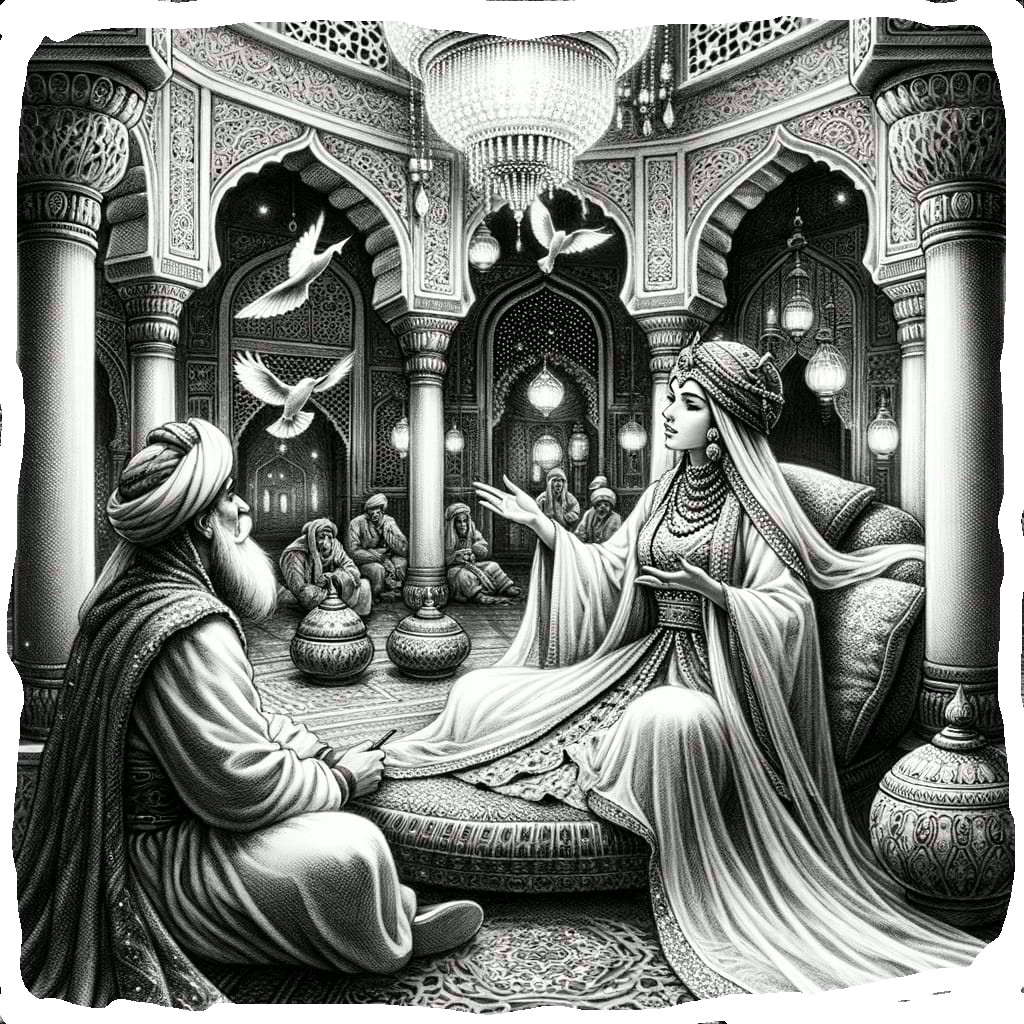
Once upon a time, in the grand kingdom of Sasanian, a king of fickle temperament and fractured heart ruled, known by the name Shahryar. Heartbroken by his queen’s betrayal, he made a proclamation as sorrowful as a dirge: each of his new brides would be granted life only until the dawn following their wedding night.
Into this deadly roulette of brides stepped Scheherazade, a woman of enchanting allure, her brilliance outshining even the brightest constellation, her wit as awe-inspiring as a grand spectacle. Scheherazade, a virtuoso of tales, spun narratives as intricate and bewitching as a weaver’s dream, each night holding the king in her storytelling thrall within the gilded grandeur of their royal chamber.
Yet it was not the narratives themselves that captured the king’s heart, but the sublime beauty of the narrator. Scheherazade was an epitome of celestial grace, her very presence an enchantment that seized Shahryar’s heart. Her flushed cheeks, her twinkling sapphire eyes, and her delicate nose, which would crinkle delightfully when she laughed, were for Shahryar an enchanting sonnet. The thought of snuffing out such a vibrant life was as unthinkable to him as treading on a garden of blossoming roses.
Each night, as Scheherazade began her tales, Shahryar found himself less absorbed in the narrative and more enthralled by the storyteller’s radiant beauty, his gaze lingering on her expressive face and the elegant movements of her lips. This calm, however, was shattered when the narratives were abruptly paused, their climaxes left frustratingly unreachable.
This incessant suspense irked him, akin to a restless tempest. Each time he wished to silence her, his gaze would fall on her – the way her eyes sparkled with mirth, her fluid, graceful movements, and the sight of her dainty nose trembling with barely suppressed amusement. Her ceaseless chatter seemed like a flaw in an otherwise perfect gem, but her charm was such that even this incessant annoyance began to seem endearing.
Indeed, his deepest wish was for her to cease her tales, her endless stories that sprawled out like a never-ending journey. He yearned for her to simply be silent, to look into his eyes with quiet affection, to be close enough for him to drink in the scent of her perfumed breath. The stories seemed an obstacle, a partition that kept them from the intimate silence he desired.
This intricate dance of stories and longing continued for a thousand and one nights. Scheherazade, with her stories that seemed to have no end, and Shahryar, lost in the captivating allure of his wife. Yet, the constant storytelling, the incessant hum of narratives, brought Scheherazade perilously close to the brink of death, for it tested the king’s patience and longing for quiet companionship to its very limit.
In the end, it was her captivating beauty and his yearning for peaceful companionship, not her stories, that saved her. Unable to bear the thought of causing harm to his beloved Scheherazade, the king relented and granted her life. Thus, the tale of Scheherazade endures, a testament to the enduring allure of beauty, love, and the power of a shared silence.
